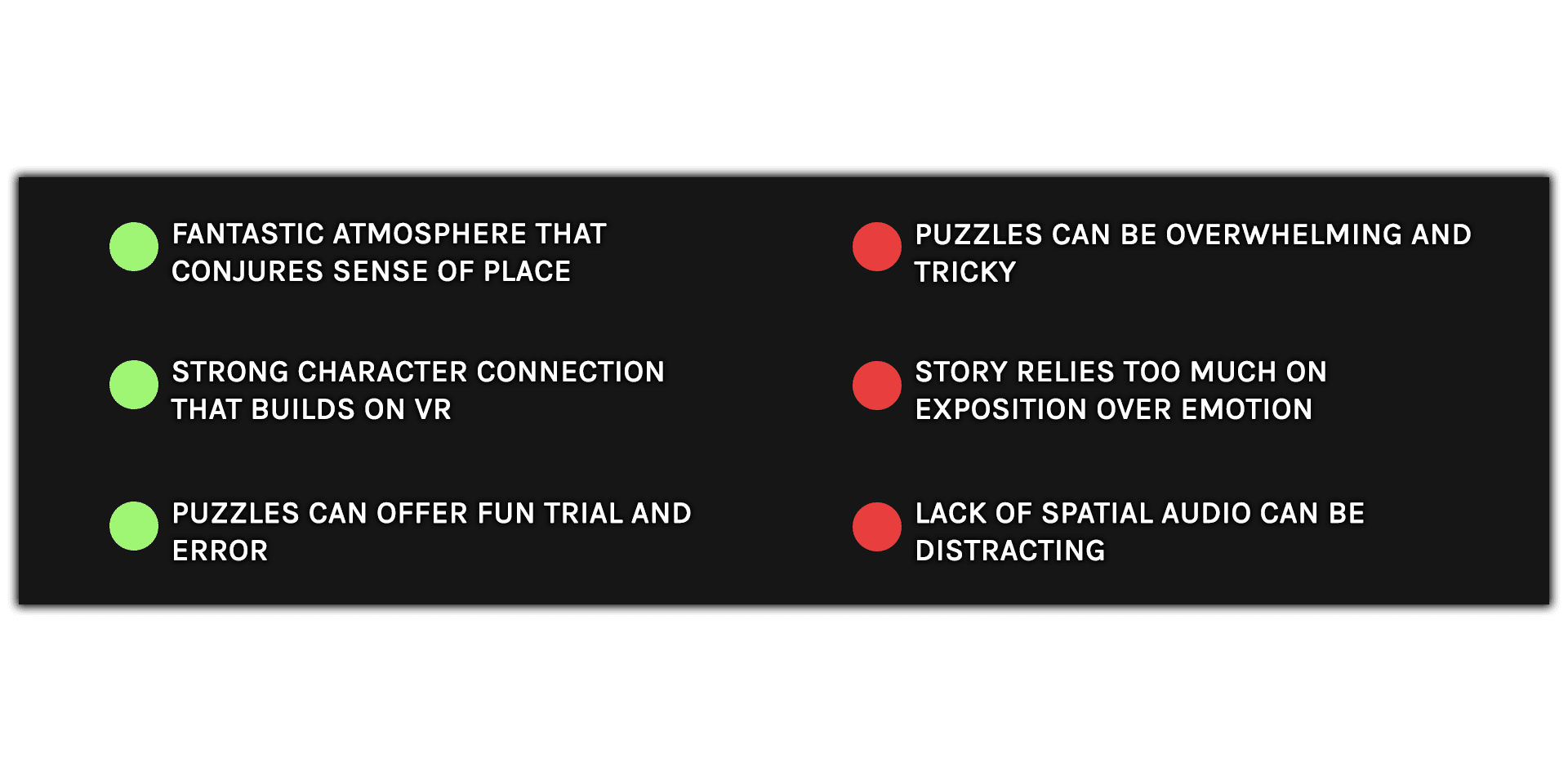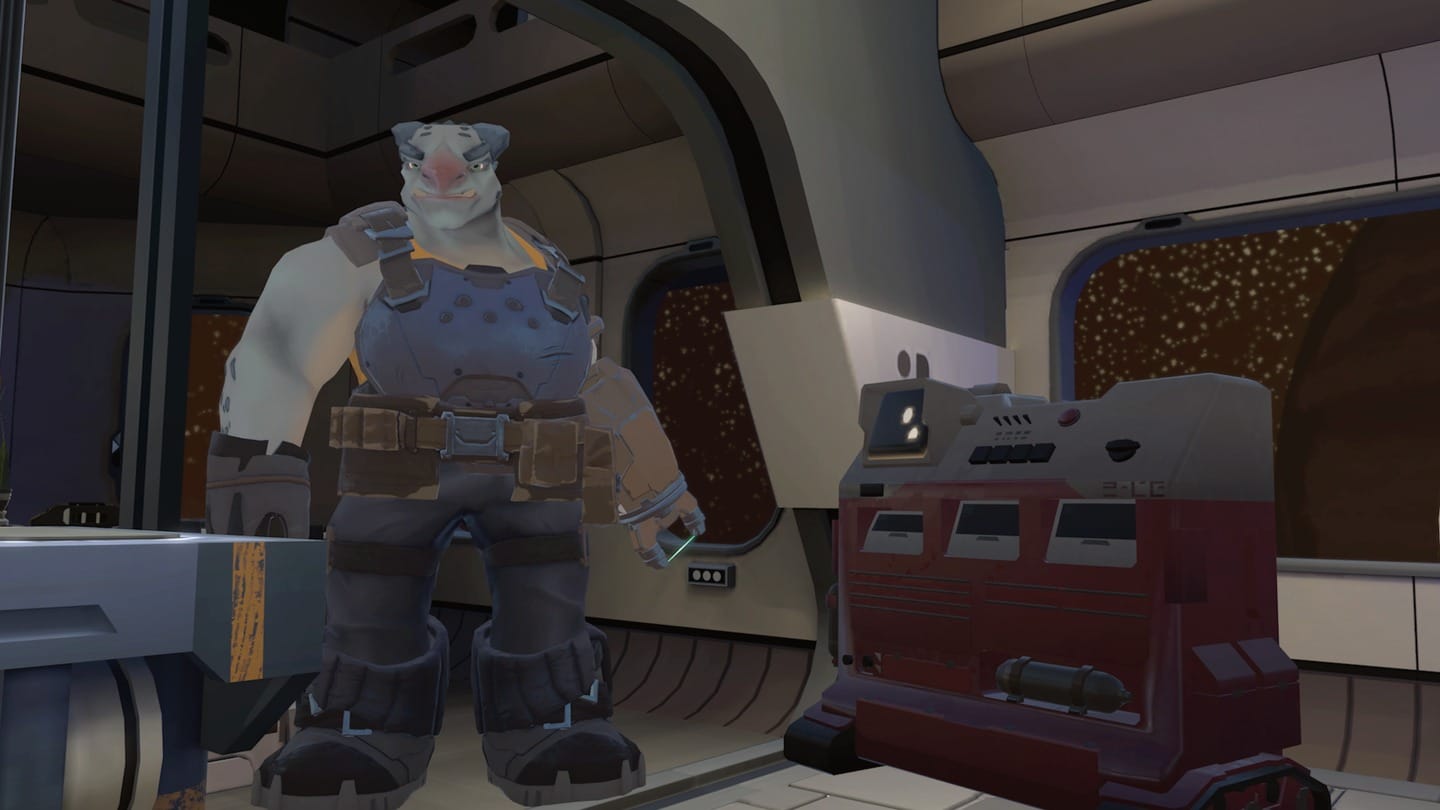Arcsmith’s puzzles are tricky and troubling, but it roots you in its world in fascinating ways. More in our Arcsmith review.
Don’t tell the kids at the back but Arcsmith is actually a sneaky piece of edutainment. Its bitty puzzles have the air of a shop class, and wrapping your head around voltage and heat output as you fashion crude bits of future gear restores a long-forgotten (for me at least) sensation of actually learning something.
But, for the learning-adverse (again, myself included), don’t let the math deter you; Arcsmith is more than the sum of its parts.
If you know developer Bithell Games well then you probably know what to expect here. Namely, there’s a deep emphasis on character-led story that’s fed to you between levels. In fact, the game’s approach to narrative is specifically tailored to VR. You play as a young Arcsmith — essentially a fancy future term for engineer — that’s placed aboard an isolated space station orbiting a planet. Joining you is Korith Dinn, a seasoned and galaxy-weary Arcsmith that reluctantly takes you under his wing as you’re sent circuitry jobs that range from fixing radios to heating terrariums.
What is it?: A VR puzzle game in which you make machinery by piecing together parts, set to the backdrop of a sci-fi story.
Platforms: Quest
Release Date: Out now
Price: $24.99
First and foremost, then, the game’s an exercise in character connection. Korith’s initially cold front soon thaws as he starts to reckon with his past and opens up. He’s a lovable guy — think Sully from Monsters Inc. without the fur — and Bithell Games touches on most of the right notes with him. There’s a lot of arresting eye contact that genuinely makes you feel like you’re in the presence of another living, breathing being, and there are moments when Korith stands over you that can feel like you’re having a real, if one-sided conversation.
Ultimately, though, the script is a little too heavy on exposition (Korith has a lot to say about his past) to earn some of the emotional beats it’s gunning for, and there isn’t much range in expression as we’ve seen in other character interactions in VR. The lack of 3D audio in the game also really hurts, as Korith can stand to one side and it sounds like he’s talking from another part of the room entirely. It’s a distracting oversight.
Puzzles, meanwhile, are more of a mixed bag. It’s essentially Lego with voltage; every level features a handful of key parts that will require a certain amount of power and heat, and you can order power generators, radiators and a range of other parts to manage it all. Eventually, you’ll get new parts the provide power in different ways and varying requirements, like using light to power a device with solar energy, dealing with power fluctuations, or building kit within certain boundaries.
Getting a grip on the inner workings of the circuity and keeping it is tough. You’ll quickly find yourself overstuffing a device with heat and power and then watching bits fly off as you power it on to test it. This can be frustrating – the game doesn’t have a means of letting you power on the device and keep it running without disaster striking a few seconds later. On the one hand, it’s a fun representation of the taxing trial and error the job includes but, on the other, you long to just sit back and take the time you need to figure things out.
I’d often find myself making ham-fisted, bloated machines without much understanding of how to streamline the process. The puzzles are at their best when you can walk it back and talk through adding in each individual part and the consequences of doing so. Arcsmith is incredibly rewarding in these moments, but they don’t come without the sensation of being overwhelmed first.
Perhaps Arcsmith’s best qualities, though, are in its more passive aspects. The fiddly puzzles and sense of place come together to conjure a genuinely convincing scene that made me nostalgic for a job I’ve never even had. Toiling away at circuits while the radio blares its (pretty sensational) soundtrack in the background, and catching glances from Korith as he did the same over the other side of the room has a strange authenticity to it. Moreover, the incoming news updates about impending intergalactic war draws striking parallels with the helplessness we all feel listening in on bulletins in today’s news climate. The difference and winning element in Arcsmith’s narrative, though, is the message that you do have the power to fight back in your own way.
Arcsmith Review – Final Impressions
Arcsmith is about a lot of things: the joys of tinkering with gadgetry, the power of character connection in VR and finding strength in darkness. It wrestles with these elements with mixed results. Puzzles have a trial and error charm but can be overwhelming and finicky, while the game’s dialogue leans too heavily on exposition over emotion. But it is a genuinely admirable attempt to build something specific to the platform – a game that puts immersion at the heart of both its storytelling and mechanics and the result is a rare, convincing sense of place. It’s good to know that, in an era of explosive VR action and rhythm games, we haven’t lost sight of that.
 For more on how we arrived at this score, read our review guidelines. What did you make of our Arcsmith review? Let us know in the comments below!
For more on how we arrived at this score, read our review guidelines. What did you make of our Arcsmith review? Let us know in the comments below!




























